"The Victory Lab," by Sasha Issenberg
Jeff Glor talks to Sasha Issenberg about "The Victory Lab: The Secret Science of Winning Campaigns."
Jeff Glor: What inspired you to write the book?
Sasha Issenberg: I have covered political campaigns, in some form or another, for fifteen years, and only recently discovered how little I knew about what they were really up to. I spent 2008 flying around with John McCain and Barack Obama as a correspondent for The Boston Globe, writing about their rallies, speeches and campaign ads. After the election, I learned that if I had wanted to understand how campaigns were seeking votes-as opposed to just airtime-I should have skipped the rallies and press conferences. Instead I should have been talking to the geeks back at headquarters, and their unlikely collaborators in commercial data warehouses and university behavorial-psych labs.
The speeches and ads hadn't changed much at all during the time I had been covering politics, but out of public view the prior decade had been a transformative one in the way people went about winning votes.
I wrote a piece for The New York Times Magazine about one major change-the introduction of field experiments, basically randomized drug trials for politics, with voters as the guinea pigs-and knew I had just begun to crack the geeks' insular world. There was a much bigger story to tell about how data and analytics had changed politics much as the Moneyball revolution had upended sports. That narrative, I thought, would amount to a kind of secret history of politics at the outset of the twenty-first century.
JG: What surprised you the most during the writing process?
SI: I had a sense of how much data campaigns had about individual voters; there had been plenty of awestruck (and, I now know from my reporting, almost entirely fanciful) stories after the 2004 election about how George W. Bush's team had figured out how to identify Republican voters by knowing that they were more likely to drink bourbon and Coors. What I didn't appreciate until well into my reporting was how much about an individual's political attitudes and behaviors campaign analysts thought they could predict from that data. In 2008, the Obama campaign generated individual statistical probabilities for every voter in America - predicting the likelihood that he or she would turn out to vote, would support Obama, would be open to voting for a black candidate for president - and updated them weekly.
Basically Obama's targeters thought these predictive-modeling tools had turned them into fortune-tellers. "We knew who these people were going to vote for before they decided," the campaign's microtargeting consultant Ken Strasma told me.
JG: What would you be doing if you weren't a writer?
SI: This is boring, but I'd probably be an editor. I've worked only in journalism, because I was lucky to learn as a teenager that it offered a venue for me to pursue my natural curiosities about the world. I'm really interested in taking apart complex systems and telling stories about how they work-whether the modern political campaign or the global sushi trade, the subject of my first book-and love the fact that I can approach them as an outsider.
JG: What else are you reading right now?
SI: I've begun Neill Lochery's Lisbon: War in the Shadows of the City of Light, 1939-45, which seems to combine two of my interests: urban history and Europe during the war. And I just got a copy of Obama Face au Pouvoir by my friend Guillaume Debré, a Washington-based correspondent for the French television network TV1. Usually foreign coverage American politics is cursory and uninformative, but I am optimistic about this one - particularly for what I expect will be a satisfying account of Obama's decision-making about Libya as it was viewed by policymakers in Paris.
JG: What's next for you?
SI: I am covering the elections for Slate: my Victory Lab blog (and longer stories) there takes the curiosities I developed in working on this book-about political data, analytics, and tactics-and applies them to day-to-day reporting. After November I will focus wholeheartedly on my next book project, a political, legal and social history of the gay-marriage debate. I've now written a bit about how political mechanics have changed in the last decade. Marriage is the topic on which political opinions have changed the most during that same time-and I'm setting out to try to understand how and why.
For more on "The Victory Lab," visit the Random House publishing website.

